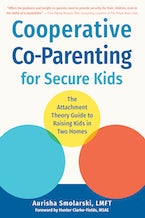By Aurisha Smolarski, LMFT, author of Cooperative Co-Parenting for Secure Kids
Going from being in a romantic relationship to co-parenting with a person you no longer want to be close to can feel daunting and overwhelming. A separation or divorce when you have kids doesn’t just entail separating your stuff and your homes and creating custody and parenting arrangements; it requires a complete mindset shift. This shift involves the roles you and your former partner play in each other’s lives, while also parenting your child.
Moreover, this shift upends your primary attachment system. The first attachment figure in your life was your earliest caregiver. As an adult, your attachment figure became your romantic partner. Now that attachment has been severed. Who is that person to you now?
Lilly and Miguel came to see me for therapy six months after ending their marriage. They were hot with anger, resentment, and shame—mixed with sadness. Although they said they wanted an amicable divorce, they were stuck in an emotional loop and unable to make important decisions together.
“Our kid is unhappy at middle school. She’s complaining she doesn’t have any friends. But I’m not sure we should move her to another school yet,” Lilly says.
“Maybe if you didn’t always quiz her about her friends, she wouldn’t feel so bad. Maybe you’re the one with issues. No wonder she doesn’t want to come out of her room,” Miguel responded, shooting her a sideways glance.
“What? I’m confused. How is this about his school?” Lilly looks to me for help.
“You’re always telling her what to do. Just like you did with me. And are still trying to do with me,” Miguel explains, his jaw tightening as his body assumes a defensive stance.
“Well, let me just remind you that I was the one who supported us. I made the money. At least you could help by sticking to our agreement about not bickering in front of our daughter.” Lilly joins the angry/defensive/blame dance they are both so accustomed to.
“Now you’re blaming me? You’re the one with all the little comments about me not working.” Miguel’s body sinks back into the couch.
“See why it’s so hard to make decisions with him?” Lilly says to me, her face full of exasperation. “I can’t do this anymore!”
What I saw were two humans struggling. They weren’t able to stick to the topic—instead each brought in old issues from the past and tried to undermine the other. And they didn’t reserve this behavior for the therapy office. Their child was witnessing it too.
Since childhood, both Lilly and Miguel had yearned to be seen, heard, and valued. They weren’t able to meet these needs in their marriage. Now, as co-parents, they were still trying—equally unsuccessfully—to look to each other for their needs to be met and acknowledged. Their anger and resentment made it hard to communicate about issues related to their child, such as decisions about school. They had one foot in the “you’re supposed to care for me” dance, and the other in the “you’re no longer my person” dance. Their anger kept them fused together, as well as prevented them from co-parenting as a team. No wonder they were stuck.
Reframing the purpose of the relationship
When you and your partner were coupled, you were each other’s go-to people for safety and security. Even if you weren’t good at meeting each other’s needs, your attachment systems were plugged into each other. When your child came into your coupledom, maintaining that attachment between the two of you remained your priority.
Now that you have gone from a romantic to a co-parenting relationship, it’s time to shift your priority away from the two of you and toward prioritizing the needs of your child. You need to reframe the purpose of your relationship so it’s centered entirely on your child.
The first step in this mindset shift involves understanding how your respective attachment systems may still be plugged into each other. Your needs are important and valid, but your ex is no longer the person to meet them. This can be confusing and a big cause of distress and conflict for co-parents.
The next step is to unplug from each other, so you can instead plug back into yourself and bring compassion and understanding to your own needs.
I worked with Lilly and Miguel to identify the different parts of themselves that had yearned to be seen, heard, and valued for a long time. They were able to move from blame to compassion when they realized that these feelings originated long ago, in their experiences with their early caregivers, and that they had continued to play this out in their relationship together. After that, they worked to hone their co-parenting roles, as distinct from their prior romantic roles.
You can use the following questions (which helped Lilly and Miguel) to identify what belonged in your romantic relationship, which is now over, and which belong in your new co-parenting one:
1. What positive and challenging aspects of your romantic relationship (not about your kids) made you a couple (e.g., sex, intimacy, seeking validation, getting emotional needs met or not)?
2. What qualities do you appreciate about each other as parents? How do you each contribute to your kid’s life?
3. In what ways can and can’t you continue to support each other as a co-parenting team?
4. What roles do you envision each of you moving into as you claim parenting on your own?
5. What resources (e.g., therapy, friends, family, yoga) do you each have to get your own emotional and healing needs met outside the co-parenting relationship?
These questions can help you shift your mindset so that you can become a cooperative co-parenting team. At the same time, you may want to continue your individual healing and work through any counterproductive patterns that keep you from successfully co-parenting your child. Within the context of co-parenting, your mindset is now focused on the sole purpose of your co-parenting relationship: to raise kids who can thrive in two homes.
Aurisha Smolarski, LMFT, is a licensed marriage and family therapist, certified co-parenting coach, and mediator with a clinical practice in Los Angeles, CA. She specializes in working with co-parents, couples, and individuals. As a mom and co-parent herself, she is very familiar with the challenges faced by parents raising kids in two households. For more than ten years, she has drawn on attachment theory and other modalities to help clients navigate their emotional whirlwinds and create a secure co-parenting family.



 2024 Peace Playbook: 3 Tactics to Avoid Clashes with Your Partner
2024 Peace Playbook: 3 Tactics to Avoid Clashes with Your Partner